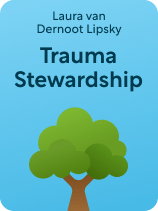

This article is an excerpt from the Shortform book guide to "Trauma Stewardship" by Laura van Dernoot Lipsky. Shortform has the world's best summaries and analyses of books you should be reading.
Like this article? Sign up for a free trial here.
How does secondary trauma cause an unhealthy work-life balance? How does an attachment to work affect your health and relationships?
One of the signs that you’re suffering from secondary trauma is that you struggle to detach from work. Trauma Stewardship by Laura van Dernoot Lipsky says that trauma caregivers are too focused on the job and think about it even when they’re supposed to be relaxing at home.
Continue reading to learn how secondary trauma causes an unhealthy work-life balance.
Struggling to Detach From Work
Lipsky states that people who work regularly with trauma sufferers often find it hard to leave work when the day is done. The cause and the people you’re helping feel too important to detach for even a minute. However, when you become overly focused on your job, Lipsky explains, you neglect the aspects of your life that are equally important, such as your relationships and your health. Let’s look at four ways an unhealthy work-life balance can manifest in your life.
- You become hypervigilant of danger: People experiencing secondary trauma often remain in a hyper-alert state to try to anticipate threats and prevent anything bad from happening.
- You experience moments of dissociation: You regularly tune out of the present moment and lose track of what you’re doing because you’re recalling a traumatic event.
- Work becomes your source of self-worth: You become obsessed with your work because helping others and making a difference makes you feel like you’re important.
- You avoid everything: When work becomes so draining, some people grow to dread it and try to avoid it entirely. You might wish an excuse would come up so you don’t have to show up to work. Lipsky argues that avoidance can become a habit: You might feel like your personal life is just as draining as your work and start to isolate yourself from family, friends, and positive activities.
How Struggling to Detach From Work Harms Your Health and Relationships
Trauma work is often very stressful, and if you struggle to detach from your work, the excessive stress can take a serious toll on your health. In Mind Over Medicine, Lissa Rankin argues that when you don’t give your body the time to rest and repair, stress can affect your health in a number of ways: It can damage your blood vessels, increase your risk of heart attacks, weaken your immune system, and lead to muscle strain and stiffness. In fact, she cites a study revealing that people who don’t take annual vacations had a 21% higher risk of dying from any cause and an increased risk of cancer.
Additionally, the symptoms of overwork are similar to the symptoms of trauma. In The Body Keeps the Score, Bessel van der Kolk describes some common symptoms of trauma, and by examining them, we can get a better understanding of how overwork affects trauma workers.
Hypervigilance: Van der Kolk argues that trauma causes hypervigilance because it’s so overwhelming that the brain separates the event into pieces—into sounds, sights, emotions, or sensations. After the event is over, your brain remains hypersensitive to threats, and a particular and otherwise harmless sound might trigger your brain. This can make it hard to relax and connect with other people.
Dissociation: People exposed to trauma dissociate to protect themselves from negative feelings and sensations. This becomes a problem, van der Kolk argues, as regularly tuning out can cause you to lose a sense of self and make it harder to manage your emotions. For example, you might struggle to relieve tension in your body if you don’t recognize that it’s your stress that’s causing it.
Obsession: People who have suffered trauma (and likely those exposed to it) sometimes become addicted to it, actively seeking out stress to crowd out other feelings like boredom or anxiety. Repeating or engaging with that trauma, however, only leads to more feelings of pain and fixation.
Avoidance: While Lipsky discusses avoidance as a result of feeling overwhelmed by work, van der Kolk adds that people who have experienced trauma also avoid social settings because they feel unable to be understood. Interacting with others, then, becomes exhausting as they constantly view others as threats.

———End of Preview———
Like what you just read? Read the rest of the world's best book summary and analysis of Laura van Dernoot Lipsky's "Trauma Stewardship" at Shortform.
Here's what you'll find in our full Trauma Stewardship summary:
- That the best way to care for others is to care for yourself
- How trauma damages the caregivers who are exposed to others' trauma
- How caregivers can manage secondary trauma to better support others






